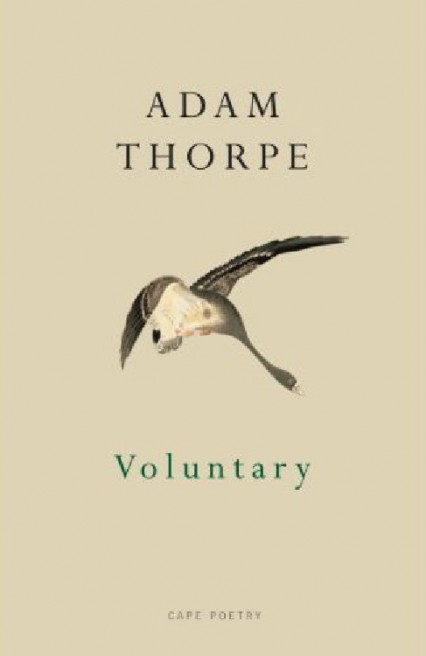Carl Griffin looks at Voluntary the latest poetry collection from the award-winning poet and author, Adam Thorpe.
Adam Thorpe is well-travelled. The countries he has lived in (Cameroon, England, France, India) throw in enough variety to enrich any collection, as well as making the born-and-bred-and-never-gone-anywhere’s stomach churn, but Thorpe’s horizons are broader, from Estonia to Sweden to the Congo. He is a man who never tires of travelling, exploring, in his homeland as well as in foreign countries. But there are glimpses of a fight against pessimism, against an attitude of been there, done that. How do we manage to continuously become impressed by amazing sights and scenarios? How do we manage not to? In ‘Sighting’, like a bored adult sat beside a boy beaming, mouth and eyes open and wide, he homes in on a sea monster who is:
repeatedly spotted − allotted
half-
before the excitement palls
and the binoculars are left
on the sill, no longer fought for.
We are small, and to some extent insignificant, people who bear the capacity to be in awe of the colossal world we inhabit, but we are armed with the beans to personify our exhilaration for only brief bursts. Thorpe, aware it is inescapably futile to endeavour to break this mould, defiantly exhibits nevertheless a wish, perhaps a throwaway sentiment, for the curse to be dispirited:
What
doesn’t, in the end, become familiar
all round, however strange or fine?
I wish that sea-
Voluntary is a Poetry Book Society Recommendation, another prize for a novelist, poet and playwright used to winning awards. For Adam Thorpe there is always enough material. Though the Paris-
Thorpe finds it more challenging though, as we all do, to express surprise and delight publicly, even among friends, or possibly particularly so. In ‘Niagara’ the astonishment is readily outlined with hindsight but caught in the moment how do we sum up our feelings when faced with apparent beauty:
That industrial, uroboric roar
drowned our lines as we shouted in macs
behind a door of water in the rock,
preferring the litotes of not bad, hey?
to open amazement.
Still, Adam Thorpe comes across as an ebullient companion to tag along with abroad, or the ignition spark in the local places you are most familiar with but have grown bored of, that invigoration to pave the way for rediscovery. He is infectiously optimistic, adventurous, forever on the qui vive for pleasure and a secret to smile at, like the grandson ‘still crawling around/with his nose so close to the ground’. This isn’t naivety, just a positive attitude. His liveliness draws him in to the web of tarnished relics, dry stone walls and drowned insects scooped out with a net from an outdoor swimming pool.

by Adam Thorpe
70pp, Jonathan Cape, £10.00
Whichever country he is in his family are never far behind. The family bond comes over strongly in this collection. At home it continues, buying flowers with his daughter in memory of someone’s death, or watching home videos together from more than a decade back. His late father is also close to his heart, along with his father’s past, his stories. The family is a unit. If you cannot experience and portray joy within that unit, it opens the door for disenchantment.
The idea that a candid expression of pleasure, of wonder at the life around us, is a tough one when we are in the presence of others, especially those we have to work with or live alongside, and which conceivably leaves us vulnerable, open to ridicule, comes to the fore in the title poem, ‘Voluntary’, when, as the narrator heads for the only gate available on a Norfolk common, a flock of geese levitate into the sky, a few separating like ‘rebellious adolescents’ only to later rejoin the group:
All but one, that is − who’s
doggedly travelling the other way, so completely alone
I could give it a name,
consider its fate.
What happens to the risk-
a voluntary
exile, free at last − or condemned to a lonely
end in some oil-
pool, garbage tip
or waste of choppy sea
The demotion of ‘exile’, ‘end’ and ‘pool’ to the next line hints at a hesitation on the narrator’s part, as if he is reciting what he knows to be the only options available. But, as he voices them, can’t help but doubt his own wisdom.
The flock explored but only alone, perhaps, could the goose respond to each discovery with more than just Not bad, hey. Though had he stayed and learned to express the joy amongst friends, the appreciation, going by Adam Thorpe’s experience, would have surely doubled.










